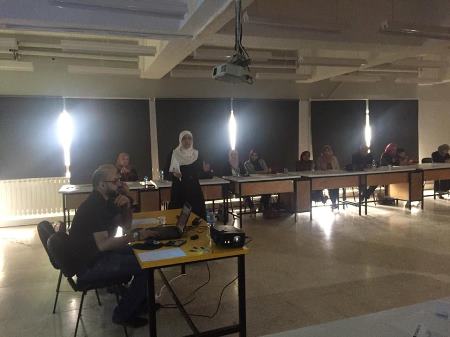|
MIFTAH participates in the Second Palestinian Urban Forum entitled: MIFTAH recently held a special meeting entitled: “Gender Equality in Urban Development: women’s impact on developing urban plans”. The meeting was part of activities held at Birzeit University on the sidelines of the Second Palestinian Urban Forum, which was organized by the Ministry of Local Government on October 30 and 31. The forum was attended by a number of town and village council members, representatives from the Ministry of Local Government, GIZ and Birzeit University professors. The meeting comes after MIFTAH’s participation in the UN Habitat III Conference on Housing and Sustainable Urban Development in Quito, Ecuador in 2016 . A presentation was given by several women members of local and village councils who MIFTAH supported by building their skills in urban planning. The meeting included a presentation of structural maps for the town of Aseera Shamaliya, which pointed to women’s needs. The women offered explanations for some proposed solutions, which constituted visual additions to the structural plan. Several recommendations were made regarding the development of MIFTAH’s experience with local and town council members including: integrating village council and municipality members in training on the topic of developing their skills for understanding and interpreting structural plans from a gender perspective; developing and empowering experts in structural and urban planning for towns such as engineers, to translate the needs of various societal sectors to the structural plans; providing space for interventions from the public in terms of planning areas for its individuals to live in a free, comfortable and safe space; working towards amending policies pertaining to the ratification of structural plans to guarantee the needs of the public and gender-based planning and to create specific spaces within LGUs and municipalities for exchanging ideas and expertise among engineers and gender experts; a call on MIFTAH to widen the circle of targeted beneficiaries of these workshops and not limit them to women only. Rather, they should be broadened to include all sectors of society through a participatory process. MIFTAH project coordinator Hassan Mahareeq said the importance of this activity is rooted in MIFTAH’s faith that women are active contributors to the process of social transformation and change. This achieves social stability and sustainable development and eventually creates a democratic, pluralist Palestinian society in which citizens’ rights are respected. He said MIFTAH seeks to include various societal sectors and identify their needs in line with the urban planning process and to take into consideration the financial and moral necessities needed to guarantee the interaction of individuals in any given space and to make them feel comfortable and safe. “This activity is particularly aimed at promoting the leadership role of local council women members through building real partnerships at various levels of decision-making positions and reflecting the needs of women in structural plans of cities and localities in order to encourage women’s partnership in managing public affairs,” Mahareeq said. Meanwhile, in her presentation, Dr. Manal Bishawi of Birzeit University called for translating the intangible needs of women into tangible ones. This, she said, requires scientific methodology that reflects the needs of women in planning and to reconsider educational curriculum at the level of knowledge and how the concept of gender is perceived and approached. The meeting concluded by including the recommendations in the closing statement of the forum. In its recommendations, MIFTAH stressed on the need to build on these experiences, which promote the participation and interaction of women in the public realm, including in urban planning. It also pushed for policy designers to adopt the recommendations and translate them into practical terms as a part of just policies that support women’s participation in decision making, especially in the local government sector.

http://www.miftah.org |